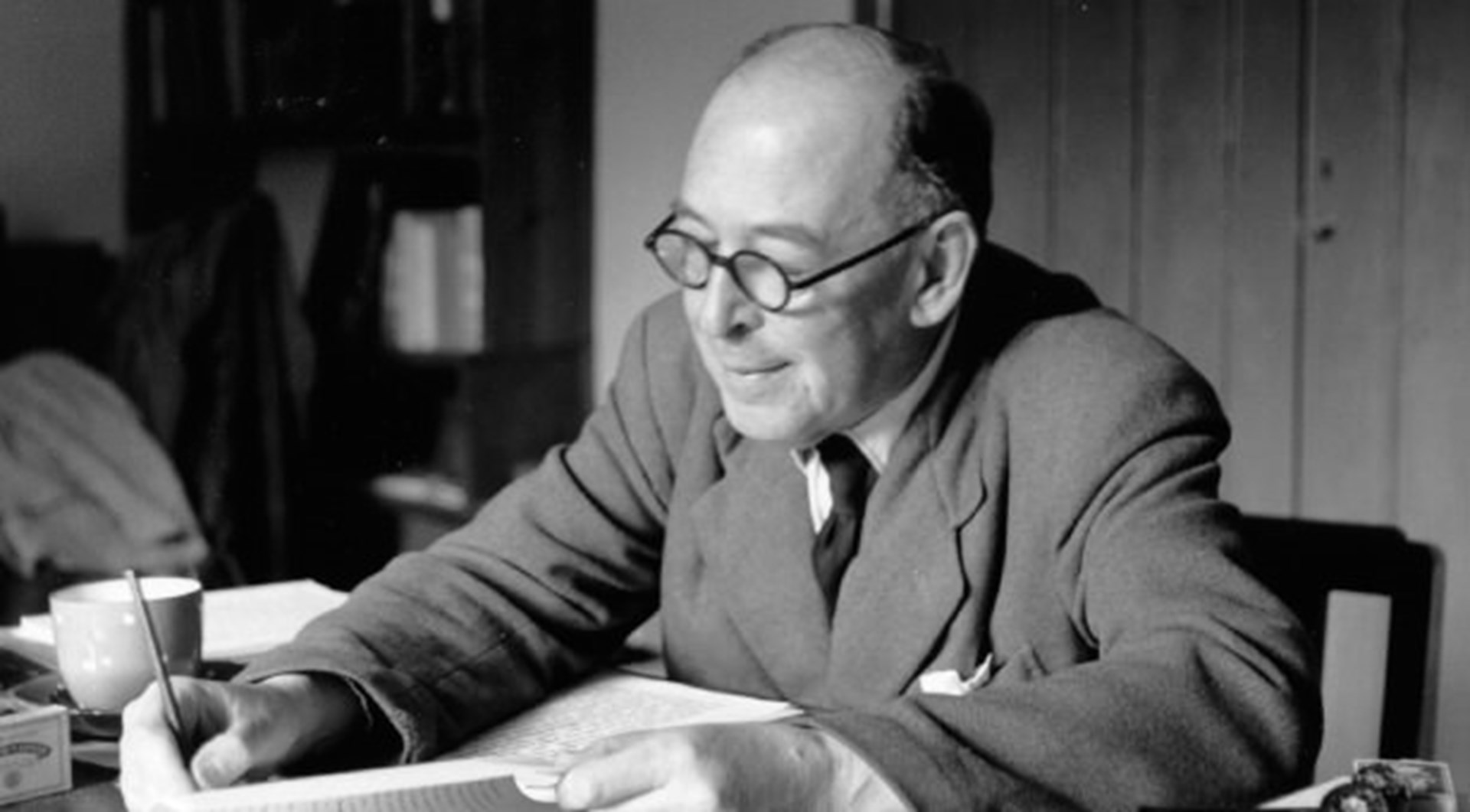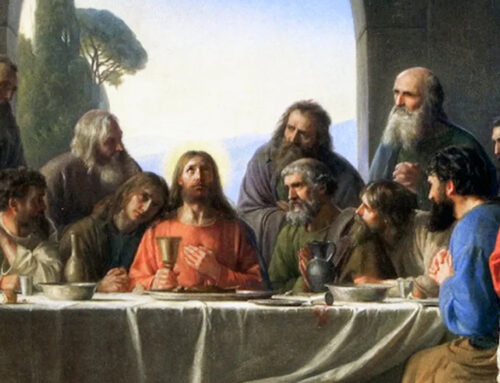It’s really common to hear people talk about Jesus as a great teacher, a good moral figure in history — someone with some admirable ideas about how to live and how to love people.
And I guess at the very least, it seems from this pretty common thing to hear, that Jesus remains a pretty likable person for our secular contemporaries — even if they really can’t stand Christianity at all…
The only problem is, as CS Lewis once put it so well: It’s actually a “really foolish thing” to say something along the lines of: “I’m ready to accept Jesus as a great moral teacher, but I don’t accept his claim to be God.” Lewis goes on to put it pretty bluntly: “You can shut him up for a fool, you can spit at him and kill him as a demon or you can fall at his feet and call him Lord and God, but let us not come with any patronizing nonsense about his being a great human teacher. He has not left that open to us. He did not intend to.”
It’s through this lens that I would like to look at today’s passage from the Gospel of Mathew which depicts yet another showdown between Jesus and the Pharisees, his opponents.
Christ has just astonished the crowd and silenced the Sadducees on the question about whether or not the Resurrection actually will happen. The Sadducees didn’t believe in that, and Jesus comes onto the scene and not only says “Actually it’s gonna happen, but I’m gonna be the first one it’s actually gonna happen to!” And that leads the Pharisees to ask him another question — to try to figure out who Jesus is and what his take is on the Mosaic Law. What is his version and emphasis on the Old Testament commandments? So they ask him:
“Teacher, which commandment in the law is the greatest?”
Jesus responds with something of a trick answer. He appears to give them not one commandment, but two: “You shall love the Lord, your God, with all your heart, with all your soul, and with all your mind. This is the greatest and the first commandment. The second is like it: You shall love your neighbor as yourself.”
Now I would proposal to you all today that this is not two commandments, but actually one. One single, great, first, and highest commandment.
Remember: Jesus cannot and will not be reduced to just another rabbi or another teacher with a new interpretation of the Law of Moses. He doesn’t point out another way of looking at the Old Testament commandments.
Rather — He IS the Way! In His own person, Jesus IS the embodied interpretation of the entire Law and Prophets. This is what sets Jesus apart from every other religious leader that has ever existed: He does not deliver yet another idea or another doctrine. He IS the Doctrine Himself. Jesus doesn’t just suggest a message. He IS the message, sent straight from God the Father.
From this perspective, therefore, when Christ responds to those Pharisees saying that the greatest commandment is twofold — the first: “You shall love the Lord, your God” and the second: “You shall love your neighbor as yourself,” he is, in a subtle yet strikingly beautiful way, pointing once again to Himself, saying:
“I AM Love of God and love of neighbor, come in the flesh. This is the greatest single commandment: You shall love me!” Love Jesus… that is the greatest and highest commandment.
Just think about that for a second — The Incarnation itself is a radical declaration and fulfillment of the greatest commandment. The Second Person of the Blessed Trinity, the Eternal Son of God, takes on a complete human nature in Jesus of Nazareth. That event, that core mystery of the Christian faith, forever unites God and humanity in an intimate, irrevocable way. Jesus is both truly Divine and truly Human — He is both our God and our neighbor at once — two natures, without confusion, without change, without division, and without separation. Heaven and earth are permanently connected now because of the fact that God became man.
Therefore, to love Jesus, to offer our life to Him, to be totally sold out for His Church and all its teachings, to be willing to die for our faith is the most definitive act of Loving God and loving our neighbor as ourself.
That’s why Jesus can say such amazing and mind-blowing things like: “Whatever you did for one of these least brothers of mine, you did for me.”
We can see Christ in the face of those most in need because He has gathered up the whole of the human race in his own Person — going so far as to equate love for the poor, the suffering, the downtrodden, and the most vulnerable with loving God Himself. The two cannot be separated now that the Word became flesh and dwelt among us.
Try loving God without bothering with your neighbor! — That faith will be a total and complete lie! After all, how could we love God without loving what and — more importantly who — He loves?
The First Letter of St. John puts it in no uncertain terms for us: If any one says, “I love God,” and hates his brother, he is a liar; for he who does not love his brother whom he has seen, cannot love God whom he has not seen.”
That’s sort of what the Pharisees were doing with Jesus right? They claimed with all confidence: “I love God!” — but then they went and crucified their brother — their neighbor — in the person of Jesus Christ, and simultaneously they crucified God.
We believe in a God is intimately involved with and concerned for every single last person who has ever existed, period. That’s what’s beautiful about that first reading today from the Book of Exodus. This passage is sort of the unfurling of the Ten Commandments. We’ve got the Ten Commandments given in Exodus 20, and then the subsequent chapters are all about “What are the implications of this?” So we hear things like:
“You shall not wrong any widow or orphan. If ever you wrong them and they cry out to me, I will surely hear their cry.” And again: “If you take your neighbor’s cloak as a pledge, you shall return it to him before sunset; for this cloak of his is the only covering he has for his body. What else has he to sleep in?”
God cares about all those things. He cares about all those people He made, so much so that he’s even worried about what they’re gonna sleep in! If they’re gonna be warm at night! That’s the kind of God we love and serve. If we really want to love and serve that God, if we’re going to be truly be religious in the best sense of that term, then we also have to care about people and seek their true good — not according to how the world says we should, but according to the way we know God is calling us to.
If we don’t, we will find in the end that we were never actually loving God at all.
But of course the opposite is true as well: Go ahead and try loving your neighbor without also loving God. That will, in the end, be a fruitless and doomed project. You might begin defending all sorts of indefensible things if you only lift up a soft, tolerant, godless “love” as your ultimate criteria.
Or you might settle for just meeting the bodily, external needs of the human person without also caring for their immortal souls, without tending to the depths of their human dignity as persons created in the image and likeness of the Triune God. When we try loving people without God in a kind of secular love, well then I have to ask: What’s the point? What is our motivation?
Because when Jesus healed people, when he met bodily needs — he always treated their spiritual wounds as well. After performing great miracles, He says things like: “My son, your sins are forgiven” and “Your faith has saved you, go in peace.”
That is the deeper, more abiding miracle of love and grace!
In our world today, there exists the grand illusion that we can “love” people simply through our own heroic efforts — especially if we have vast amounts of money, or if our own political part is in control, or if we just come up with the best hashtag that we can virtue signal with! All we need is to demand that everyone fall in line, and the world will be a more loving place magically. That doesn’t happen.
We need God.
If we believe that secular lie… then God is out of a job. We can love people just fine without Him…
But we learn in Sacred Scripture that at the end of the day, we love only because God first loved us. In fact, God IS Love, and that Divine Love is poured into us by the gift of the Holy Spirit. We can only love because Jesus is the one loving people through us. That in fact, it’s His life that fills us, that is given to us in Baptism. We’re adopted into HIS life. And over the course of our lives in relationship with Him, we get to learn how to love.
And here again we return to the mystery of the Incarnation. Every baptized Christian is called to be “another Christ” in this world. Parents — You’re called to be “other Christs” for your family, leading your children and the people in your own circles of influence into intimacy with the Father. That’s what holiness is: to live out the life of Jesus, made available to us through His Passion, and through His Death, and through His Resurrection.
We have the opportunity by God’s grace to become like Jesus — to be living, breathing expressions of the single greatest commandment: To love God with all our soul, heart and mind, and to love our neighbor as ourselves.
We only find the strength for that on the altar in the Holy Eucharist. Because right here is where God’s love is poured out for us sinners, and we get to taste the fruits of His Cross and Resurrection.
And then when we receive that into us, and we’re filled with His life, worshipping God together as One Body — we can then go back out into the world and love this world (as hard as it is to love sometimes) with the love of Jesus Christ.




